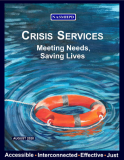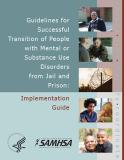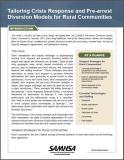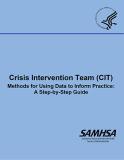
The book is composed of SAMHSA’s “National Guidelines for Behavioral Health Crisis Care: Best Practice Toolkit” and related papers on crisis services. The toolkit reflects relevant clinical and health services research, review of top national program practices and replicable approaches that support best practice implementation. The related papers address key issues relevant to crisis services, homelessness, technology advances, substance use, legal issues impacting crisis services, financing crisis care, diverse populations, children and adolescents, rural and frontier areas, and the role of law enforcement.
Units per Product
Download
Crisis Services: Meeting Needs, Saving Lives
File Type: PDF
File Size: 4.43 MB







